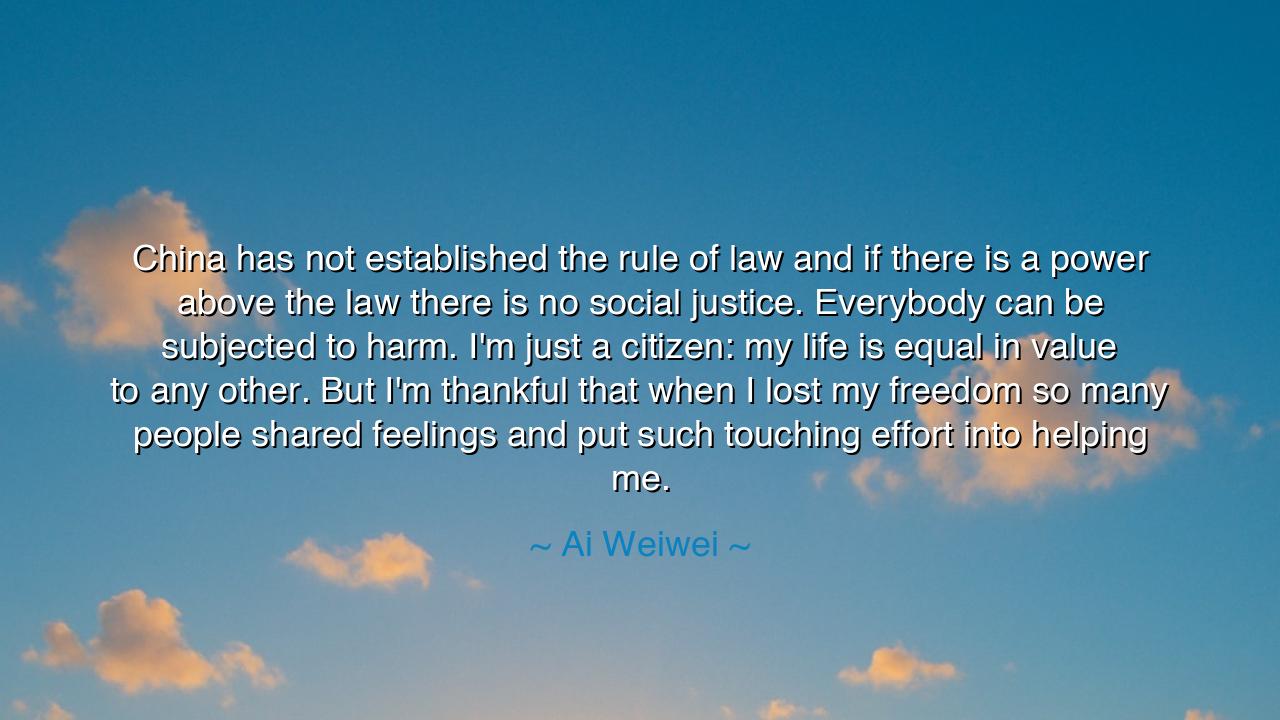
China has not established the rule of law and if there is a
China has not established the rule of law and if there is a power above the law there is no social justice. Everybody can be subjected to harm. I'm just a citizen: my life is equal in value to any other. But I'm thankful that when I lost my freedom so many people shared feelings and put such touching effort into helping me.






Hear the words of Ai Weiwei, the artist who became a voice for the voiceless, who endured the chains of oppression and yet spoke with a spirit unbroken: “China has not established the rule of law and if there is a power above the law there is no social justice. Everybody can be subjected to harm. I’m just a citizen: my life is equal in value to any other. But I’m thankful that when I lost my freedom so many people shared feelings and put such touching effort into helping me.” In these words lies a lesson for every age: that without justice, no man is safe, and that even in suffering, solidarity can kindle hope.
The rule of law has always been the foundation of just societies. When law is higher than kings, the weak are protected from the strong. But when rulers place themselves above it, law becomes no shield but a weapon, wielded at whim. Ai Weiwei warns of this danger, for in such a world everybody can be subjected to harm, no matter their rank or station. His voice echoes the ancients: Aristotle himself taught that “law should govern,” not the passions of men. Without this, there is no social justice, only the tyranny of power.
Yet Ai does not raise himself above others. He calls himself simply a citizen, reminding us that the true measure of worth is not titles, wealth, or fame, but the shared dignity of life. This humility is the strength of his testimony. He places himself not on a pedestal but in solidarity with the many, saying: “my life is equal in value to any other.” In this, he speaks the wisdom of the Stoics, who taught that all men, slave or emperor, share the same divine spark of reason and deserve the same measure of justice.
When he speaks of losing his freedom, we hear the echo of countless before him who bore chains for the sake of truth. Recall the story of Socrates, condemned to drink the hemlock because he would not abandon his search for wisdom. Socrates too declared himself no different from other men, only that he would rather die than betray truth. So Ai Weiwei, though silenced and confined, found strength not in despair but in the thankfulness he felt for the solidarity of those who stood with him. For even in chains, he was not alone.
This is the mystery of suffering: that when one is stripped of liberty, it is often the compassion of others that restores dignity. Ai tells us that people shared their feelings, gave their voices, and put forth touching efforts to support him. In this he reveals that even against the machinery of oppression, the strength of human solidarity is a power that cannot be extinguished. The ancients too knew this truth—when Cicero was exiled from Rome, letters poured in from his friends, and their support gave him strength to endure until his return.
What lesson shall we take? That we must guard the rule of law as the protector of all, for without it, justice dies and power devours the innocent. But also, that we must never underestimate the strength of compassion. When another suffers injustice, do not remain silent. Add your voice, your support, your presence—for these are the weapons of the powerless, and together they can shake the foundations of tyranny.
Practical wisdom flows from his words. Be vigilant in defending justice, whether in your nation, your community, or your family. Do not allow any “power above the law” to go unchallenged. Treat every citizen with equal dignity, no matter their station. And when you see one stripped of freedom, stand with them, speak for them, and show gratitude for the humanity you share. For as Ai Weiwei himself testifies, it is this solidarity that makes endurance possible, and this shared struggle that keeps the flame of hope alive.
Thus, the words of Ai Weiwei are not merely a cry against injustice but a hymn to the power of unity. He reminds us that without law there is no justice, without justice no peace, but with compassion even the darkest prison can be lit with hope. Remember then: defend justice, honor equality, and give thanks for the strength of community. For in standing together, humanity becomes unbreakable.






AAdministratorAdministrator
Welcome, honored guests. Please leave a comment, we will respond soon